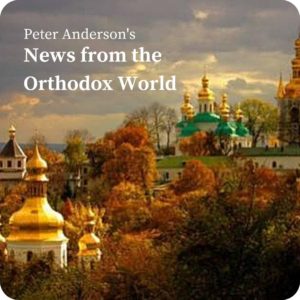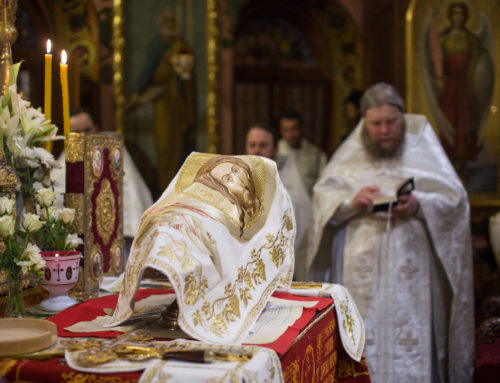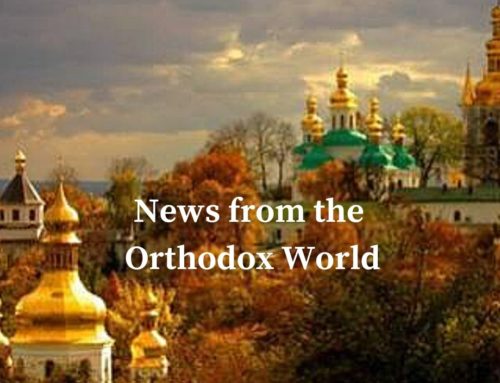Peter Anderson reports from the Orthodox world.
Longstanding reporter of the news from the Eastern Church, Peter Anderson shares our dream of a unified Christianity. His love for Orthodoxy has driven him to this personal mission to share the news of East with the world through his email list. The Urbi et Orbi Foundation is proud to share his efforts and his insights with you.

Metropolitan Hilarion has again taken aim at Ecumenical Patriarch Bartholomew. This is the latest of the personal attacks against Bartholomew that have occurred during the last few years. Interestingly, this latest attack relates to the Ecumenical Patriarch’s close relations with Pope Francis and the Catholic Church in general. The attack was made last weekend by Metropolitan Hilarion on his television program Church and the World and can be read at https://mospat.ru/ru/news/87529/. The video of the program can be watched at https://www.youtube.com/watch?v=An0ib0bl52A Without mentioning any names, the Metropolitan refers to a statement made by “one of the hierarchs of the Patriarchate of Constantinople” that the “process of uniting Catholics and Orthodox — in the finishing stretch [на финишной прямой].” This is a reference to a Vatican News interview of Metropolitan Polycarpos (Stavropoulos), the newly elected Orthodox Metropolitan of Italy. A video of the actual interview can be watched at https://www.youtube.com/watch?v=D-ExR2krFeo According to the English translation by the Vatican’s Pontifical Council for Promoting Christian Unity, the Metropolitan said, “The journey of Catholics and Orthodox is on the right road, under the guidance of the Holy Spirit, and is going towards its goal.” https://www.christianunity.va/content/unitacristiani/en/news/2021/2021-05-24-visit-metropolitan-polycarpos.html The actual words in Italian are: “Il cammino di cattolici e ortodossi è sulla buona strada, sotto la guida dello Spirito Santo, e sta andando verso il suo traguardo.” Metropolitan Hilarion stated in his program:
What are the hierarchs of Constantinople talking about, what is happening in the Phanar on the sidelines, what plans are being hatched, we do not always know. The Patriarch of Constantinople has recently imagined himself to be the arbiter of the destinies of Orthodoxy. He believes that he can make decisions on his own.
….
I think that against the background of such absurd and anti-canonical decisions, it will not be surprising if the Patriarch of Constantinople, without the consent of other Local Orthodox Churches, without addressing the many issues that are on the agenda of the Orthodox-Catholic dialogue, would simply announce that reunification has taken place, would sign some kind of paper. For us, for the Russian Orthodox Church, this paper will mean nothing.
Metropolitan Hilarion also refers to the Orthodox – Catholic official theological dialogue. https://mospat.ru/en/news/87531/ (English). According to him, “[w]hat Constantinople was engaged in the Orthodox-Catholic dialogue in the last years was an attempt to manipulate Local Orthodox Churches with the aim to recognize the model in which the Patriarch of Constantinople would receive some exclusive powers.”
On the other hand, Archdeacon John Chryssavgis (Archdiocese of America – Ecumenical Patriarchate) has now returned the fire and has attacked Metropolitan Hilarion. https://www.commonwealmagazine.org/alfeyev-lavrov It is an extremely strong attack as you will see by reading it. It concludes:
There is indeed a purpose in the words of Hilarion Alfeyev. It is the same purpose that imbues the words of Sergey Lavrov. Metropolitan Hilarion and his state patrons are more interested in a spectacle of conformity than in a spirit of unity. It’s just that we can’t tell who is speaking on behalf of whom anymore. The hand has grown into the glove.
Personally, I am sadden by the attacks on Ecumenical Patriarch Bartholomew and on Metropolitan Hilarion. I have been a great admirer of Metropolitan Hilarion since I first met him in person in July 2000. He has such incredible talent! Now he has publish another book – this one entitled: The Gospel of Dostoevsky. https://www.hilarion.ru/social/v-moskve-proshla-prezentatsiya-knigi-mitropolita-volokolamskogo-ilariona-evangelie-dostoevskogo.html I am also a great admirer of Ecumenical Patriarch Bartholomew. I believe in his sincerity, and I admire his pioneer work on the environment. As a Catholic, I believe that his close friendship with Pope Francis is wonderful. In seeing these attacks, my present sadness reminds me of my childhood. When I was 12 years old, my parents were divorced. I lived with my mother, and she would continue to say negative things about my father after they were divorced. Obviously, she felt hurt, but I did not want to hear about it because I loved both of my parents very much. Now I do not want to hear these bad things about Bartholomew and Hilarion. I cannot help but think about the wise advice of Patriarch Porfirije of Serbia to “do everything to blunt all possible blades among the people” in attempting to resolve disputes.
The above remarks by Metropolitan Hilarion may have been intentionally timed to precede the annual visit of a representative of the Ecumenical Patriarchate to the Vatican for the feast of Saints Peter and Paul. On June 28, the Pope met with Metropolitan Emmanuel of Chalcedon, this year’s representative from the Ecumenical Patriarchate. The official English translation of the Pope’s remarks to the Metropolitan are found at https://www.vatican.va/content/francesco/en/speeches/2021/june/documents/20210628-patriarcato-costantinopoli.html . One remark that caught my attention was the following: “A fine prophetic sign would be closer cooperation between Orthodox and Catholics in the dialogue with other religious traditions, an area in which I know you, dear Eminence Emmanuel, are very much involved.” This perhaps suggests that the Catholic and Orthodox Churches should work together in dialoging with Islam – an interesting idea. The Metropolitan was also interviewed by the Vatican’s Andrea Tornielli. https://www.vaticannews.va/en/church/news/2021-06/metropolitan-emmanual-interreligious-dialogue-interview.html In the interview, there was some discussion of a common Easter date.
In Belarus, July 3 is the national holiday of “Independence Day,” commemorating the liberation of Minsk from Nazi occupation. On June 11, Alexander Rumak, the Commissioner for Religious and Ethnic Affairs for Belarus, sent a letter to the Catholic Church in Minsk that the Council of Minister had requested that prayers “For Belarus” be offered by all denominations in Belarus on this holiday. A photocopy of this letter is found at https://euroradio.fm/ru/katolikam-predlozhili-3-iyulya-organizovat-molitvu-za-belarus. The Belarusian Orthodox Church apparently received a similar letter and has posted on its website a notice that prayers and the ringing of the bells would occur at all churches and monasteries after the Divine Liturgy on July 3. https://church.by/news/v-hramah-i-monastyrjah-belorusskoj-pravoslavnoj-cerkvi-budut-vozneseny-molitvy-o-mire-na-belorusskoj-zemle-i-o-edinstve-naroda-bozhija-2 The Catholic Church has also posted on its website a notice from the Curia of the Minsk-Mogilev Archdiocese. https://catholic.by/3/news/belarus/13476-pavedamlenne-kuryi-minska-magiljo-skaj-arkhidyyatsezii The notice includes the following: “If the opportunity arises, please add a call to the common prayer of the faithful during any Holy Mass on July 3 for unity and peace in our country, as well as a call that the decisions taken today, in the XXI century, do not lead to that horror which took place in the twentieth century. Also on this day, July 3, the Curia encourages at the end of Holy Mass to sing the hymn Mighty God, in which we will ask Almighty God to save us and our land from all evil. ” As stated at https://telegraf.by/obshhestvo/uzhe-tochno-ne-po-planu-belorusskie-katoliki-budut-pet-3-ijulya-gimn-magutny-bozha/ , the government authorities will certainly not like the singing of this hymn. Critics of the hymn point out that the hymn was derived from a poem composed by Natalia Arsenieva, whose husband was a commander of a military unit in Belarus that supported the Nazis. A different person, who actually composed the hymn in 1947, does not have a negative history. After the War, the hymn became very popular, and it was even proposed in 1993 to be the national anthem of Belarus. Last year, the hymn was frequently sung by protesters in Belarus.
On June 15 the Vatican announced that Monsignor Visvaldas Kulbokas has been appointed apostolic nuncio to Ukraine. https://press.vatican.va/content/salastampa/it/bollettino/pubblico/2021/06/15/0385/00842.html Kulbokas is Lithuanian, is 47 years old, speaks Russian fluently, and has been a member of the Holy See Diplomatic Service since 2004. Before assuming his new responsibility, he will be ordained an archbishop. Perhaps due to the pandemic, the position of nuncio in Ukraine has been vacant since the departure of Archbishop Gugerotti in July 2020.
Visvaldas Kulbokas was born in the Lithuanian port city of Klaipėda and attended school there. During the Soviet era in Lithuania, the Russian language was a compulsory subject in schools. Also Klaipėda had the greatest number of ethnic Russians of any major Lithuanian city. It is therefore not surprising that Visvaldas Kulbokas became fluent in Russian. In 1992 he entered the Catholic seminary in Telšiai. After further education in Rome, he was ordained a priest of the Telšiai diocese in 1998. Subsequently, he trained in Rome for the diplomatic service of the Holy See. After serving in the nunciature in Lebanon and the Netherlands, he was the first secretary (the highest position under the nuncio) at the nunciature in Moscow from 2009 to 2012. There he became acquainted with Archbishop Hilarion at the DECR. The following is an English-language article of their first meeting on December 3, 2009. https://mospat.ru/en/news/58083/ The two probably shared some memories as Archbishop Hilarion had begun his religious life in Lithuania in January 1987 and was ordained a priest in Vilnius later in 1987. As a young priest, Hilarion’s first assignment was to be the rector of the Orthodox church in Telšiai together with the churches in three nearby villages. https://www.hilarion.ru/en/ Hilarion lived in Telšiai for two years (1988 – 1990). Telšiai is a very historic town with a relatively small population of approximately 21,500. Kulbokas, of course, attended the Catholic seminary in Telšiai and became of priest of the Telšiai diocese. Both men could reminisce about their past days in Telšiai.
After returning to Rome in 2012, Monsignor Kulbokas was assigned to the Relations with States Section of the Vatican’s Secretariat of State. Here he had special responsibility for relations with the countries of the former USSR. His fluency in Russian and translating skills were also in high demand. He translated for Pope Francis for all of the Pope’s three meetings with President Putin (2013, 2015, 2019). He translated for Pope Francis at his historic meeting with Patriarch Kirill in Havana in February 2016. When Cardinal Pietro Parolin traveled to Moscow in August 2018, he was accompanied by Msgr. Kulbokas. https://www.hilarion.ru/en/social/metropolitan-hilarion-meets-with-holy-see-secretary-of-state.html (article concerning meeting with Metropolitan Hilarion; in the photos, it is easy to identity Msgr. Kulbokas because he has the height of a Lithuanian basketball player). On the various occasions when Metropolitan Hilarion has met with Pope Francis at the Vatican, Msgr. Kulbokas was frequently there. All of this does not mean that Kubokas will favor the Moscow Patriarchate in his new job in Kyiv, but his good relations with the Moscow Patriarchate will be helpful.
Peter Anderson, Seattle USA [which today is experiencing the hottest day every recorded here]


